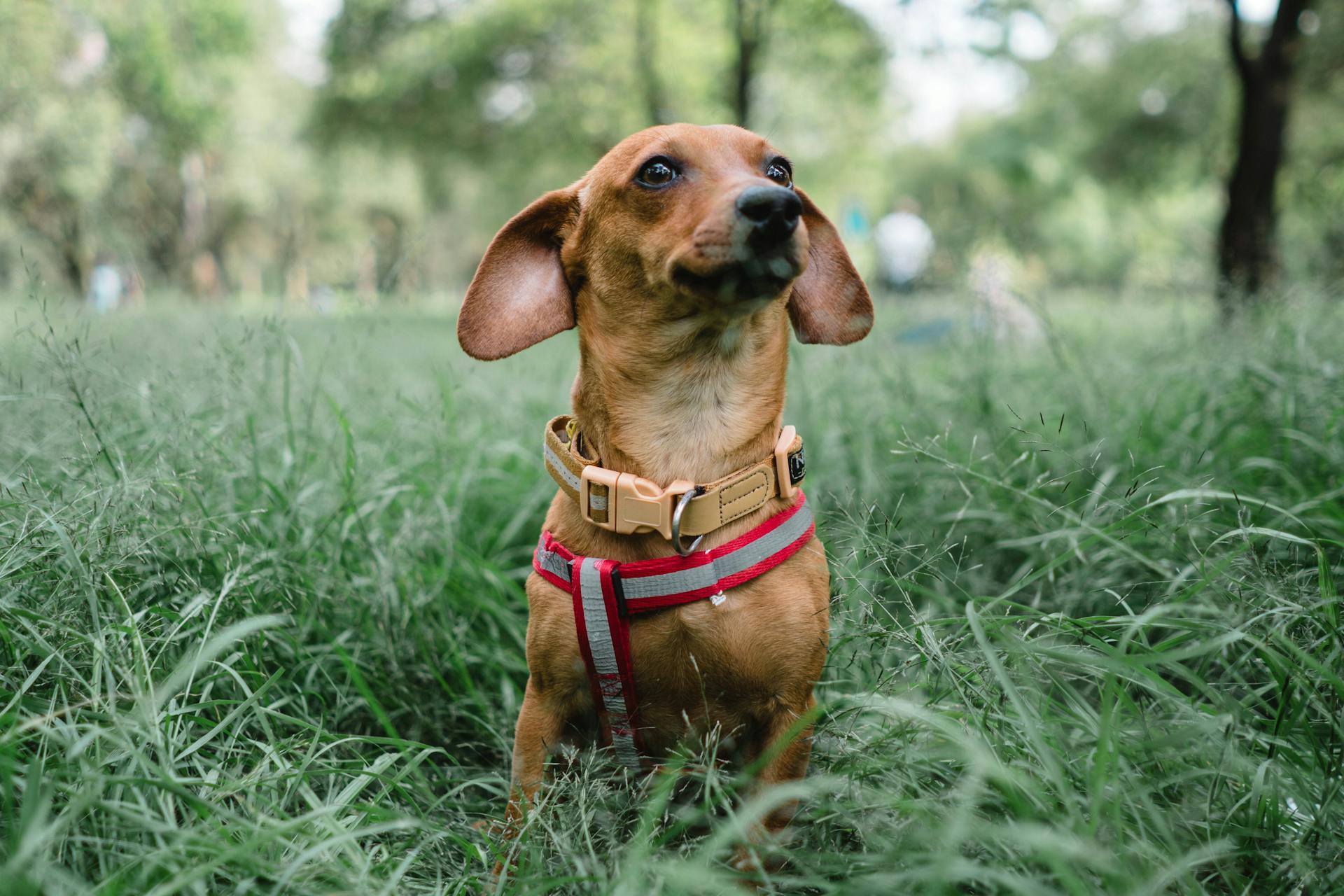
Shih Tzus are known to be social dogs that thrive on human interaction, but sometimes they can get aggressive and bite.
According to research, Shih Tzus have a unique temperament that can make them prone to biting if not properly socialized and trained.
A common reason for Shih Tzu aggressive biting is fear or anxiety, which can be triggered by loud noises, new environments, or strangers.
To prevent aggressive biting, it's essential to establish a strong bond with your Shih Tzu through positive reinforcement training and plenty of affection.
Curious to learn more? Check out: Female Dog Biting Tail
Understanding Shih Tzu Aggression
Shih Tzus are generally friendly and well-mannered dogs, but like any breed, they can exhibit aggressive behavior under certain circumstances. Recognizing the signs of aggression is crucial to addressing the issue promptly and ensuring the safety of both the dog and those around them.
Growling or snarling is a common sign of aggression in Shih Tzus, indicating an attempt to assert dominance or warn others to keep their distance. Baring teeth, lunging or snapping, and stiff body posture are also red flags that your Shih Tzu may be feeling threatened or provoked.
Readers also liked: Shih Tzu Aggression
It's essential to differentiate between aggression and playfulness in Shih Tzus. Playful behavior usually involves a wagging tail, relaxed body posture, and an open and relaxed mouth, while aggression is characterized by a tense body, defensive postures, and vocalizations.
Some common causes of aggression in Shih Tzus include lack of socialization, fear and anxiety, health issues, and territorial instincts. Identifying the specific cause or triggers for aggression in your Shih Tzu is crucial in developing an effective behavior modification plan.
Here are some common signs of aggression in Shih Tzus:
- Growling and snarling
- Head and tail up
- Frozen stance
- Direct stare
- Snapping
It's also essential to consider that every dog is an individual, and their temperament can vary. Proper socialization, training, and responsible ownership are key to a well-behaved and balanced Shih Tzu.
Dogs can exhibit aggression for various reasons, including feelings of fear, anxiety, or pain. Identifying the underlying cause of aggression can help you develop a plan to address the issue and prevent future incidents.
By understanding the signs of aggression and the common causes, you can take proactive steps to prevent aggressive behavior in your Shih Tzu and build a stronger bond with your furry friend.
Preventing and Managing Aggressive Behavior
Preventing and managing aggressive behavior in Shih Tzus requires a comprehensive approach that addresses the underlying causes of aggression. Early socialization is key to helping your Shih Tzu develop confidence and reducing fear-based aggression.
Recognizing the signs of aggression is crucial in managing the behavior. Growling, snarling, baring teeth, lunging, and snapping are all clear signs of aggression in Shih Tzus. A stiff body posture, including an upright tail and rigid body, can also indicate aggression.
Identifying the triggers for aggressive behavior is essential in developing an effective behavior modification plan. Shih Tzus may show aggression in response to fear, anxiety, resource guarding, territorial issues, or even pain. Understanding the root cause of aggression is crucial in managing the behavior.
To prevent aggressive behavior, focus on early socialization, positive reinforcement training, and regular veterinary check-ups. Provide a secure and comfortable environment for your Shih Tzu, meeting their basic needs and establishing clear boundaries and rules.
Consider reading: Fear and Hunger Dogs
A table summarizing the key steps to preventing aggressive behavior in Shih Tzus:
By following these steps and understanding the signs of aggression, you can help prevent and manage aggressive behavior in your Shih Tzu.
Shih Tzu Breed and Behavior
Shih Tzus are known for their cheerful and loving personalities, and they're typically friendly with people of all ages and other dogs. They're not naturally aggressive, but every dog is an individual, and some may exhibit aggressive behavior due to inadequate socialization or training.
Lack of socialization is a common cause of aggression in Shih Tzus, and it's essential to expose them to various people, animals, and environments from an early age. This helps them develop confidence and reduces fear-based aggression.
Fear and anxiety can also lead to aggression in Shih Tzus, and it's crucial to address any underlying medical conditions that may be contributing to these feelings. Pain or discomfort can cause a Shih Tzu to behave aggressively, so regular veterinary check-ups are vital.
Intriguing read: Dog Fear Aggression
Small size doesn't determine how aggressive a dog can be, and Shih Tzus may still exhibit aggressive behavior if provoked or inadequately socialized. Size is not a reliable indicator of aggression.
Proper socialization, training, and responsible ownership are key to a well-behaved and balanced Shih Tzu. Early socialization can prevent aggression, and positive reinforcement training encourages good behavior and fosters a strong bond between dog and owner.
Shih Tzus are not inherently aggressive, but their protective nature can lead to territorial instincts and aggression in response to perceived threats. Identifying the specific cause or triggers for aggression is essential in developing an effective behavior modification plan.
A unique perspective: Separation Anxiety Dogs Crate
Sources
- https://www.askthedogguy.com/aggressive-shih-tzu/
- https://www.bbsimperialshihtzus.com/single-post/2016-1-21-aggressive-behavior
- https://vocal.media/petlife/are-shih-tzu-aggressive-the-ultimate-guide
- https://www.doggoneproblems.com/jack-tips-to-like-people/
- https://www.hepper.com/are-shih-tzus-aggressive/
Featured Images: pexels.com


